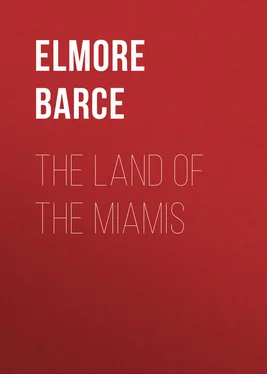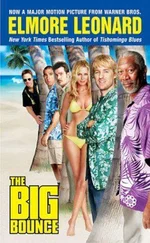Elmore Barce - The Land of the Miamis
Здесь есть возможность читать онлайн «Elmore Barce - The Land of the Miamis» — ознакомительный отрывок электронной книги совершенно бесплатно, а после прочтения отрывка купить полную версию. В некоторых случаях можно слушать аудио, скачать через торрент в формате fb2 и присутствует краткое содержание. ISBN: , Жанр: foreign_antique, foreign_prose, Историческая проза, на английском языке. Описание произведения, (предисловие) а так же отзывы посетителей доступны на портале библиотеки ЛибКат.
- Название:The Land of the Miamis
- Автор:
- Жанр:
- Год:неизвестен
- ISBN:http://www.gutenberg.org/ebooks/30244
- Рейтинг книги:4 / 5. Голосов: 1
-
Избранное:Добавить в избранное
- Отзывы:
-
Ваша оценка:
- 80
- 1
- 2
- 3
- 4
- 5
The Land of the Miamis: краткое содержание, описание и аннотация
Предлагаем к чтению аннотацию, описание, краткое содержание или предисловие (зависит от того, что написал сам автор книги «The Land of the Miamis»). Если вы не нашли необходимую информацию о книге — напишите в комментариях, мы постараемся отыскать её.
The Land of the Miamis — читать онлайн ознакомительный отрывок
Ниже представлен текст книги, разбитый по страницам. Система сохранения места последней прочитанной страницы, позволяет с удобством читать онлайн бесплатно книгу «The Land of the Miamis», без необходимости каждый раз заново искать на чём Вы остановились. Поставьте закладку, и сможете в любой момент перейти на страницу, на которой закончили чтение.
Интервал:
Закладка:
But the wisdom and the broad national views of the leading Virginia law-makers and statesmen, had already, in great measure, pointed the way to the Indian policy to be pursued by Washington and his successors. No state, either under the old confederation or the new constitution, presented such a formidable array of talent and statecraft as Virginia. Washington, Jefferson, John Marshall, and Madison, stood pre-eminent, but there was also Edmund Randolph, Patrick Henry, James Monroe, George Mason, William Grayson and Richard Henry Lee.
Washington had always taken a deep and abiding interest in the western country. In 1770 he had made a trip down the Ohio in company with his friends, Doctor Craik and William Crawford. The distance from Pittsburgh to the mouth of the Great Kanawha was two hundred and sixty-five miles. The trip was made by canoes and was rather hazardous, as none of Washington's party were acquainted with the navigation of the river. The party made frequent examinations of the land along the way and Washington was wonderfully impressed with the future prospects of the country. Arriving at the mouth of the Great Kanawha, he ascended that river for a distance of fourteen miles, hunting by the way, as the land was plentifully stocked with buffalo, deer, turkeys and other wild game. He also made critical observations of the soil here, with a view to future acquisitions. The whole country below Pittsburgh at that time, was wild and uninhabited, save by the Indian tribes.
At the close of the revolution the minds of Washington, Jefferson and other leading Virginians were filled with the grand project of developing and colonizing the west, and binding it to the union by the indissoluble ties of a common interest. There was nothing of the narrow spirit of provincialism about these men. Their thoughts went beyond the limited confines of a single state or section, and embraced the nation. They entertained none of those jealousies which distinguish the small from the great. On the contrary, they looked upon the mighty trans-montane domain with its many watercourses, its rich soil, and its temperate climate, as a rich field for experimentation in the erection of new and free republics. The deed of cession of Virginia had provided: "That the territory so ceded shall be laid out and formed into new states, containing a suitable extent of territory, not less than one hundred, nor more than one hundred fifty miles square, or as near thereto as circumstances will admit: and that the states so formed should be distinct republican states, and admitted members of the federal union, having the same rights of sovereignty, freedom, and independence, as the other states." If this great public domain, thus dedicated to the whole nation, and under the control of its supreme legislative body, the continental congress, could be filled up with a conglomerate population from all the states, factions and sectional jealousies would disappear, and at the same time the original states would be more closely knit together by the bonds of their common interest in the new federal territory.
But there was one great obstacle to the realization of these hopes, and that was the difficulty of opening up any means of communication with this western empire. The mountain ranges stood as barriers in the way, unless the headwaters of such rivers as the Potomac and the James, could be connected by canals and portages with the headwaters of the Ohio and its tributaries. If this could be accomplished, and if the headwaters of the Miami, Scioto and Muskingum, could be connected in turn with those of the Cuyahoga, the Maumee and the Wabash, then all was well, for this would furnish an outlet for the commerce of the west through the ports and cities of the Atlantic seaboard. There were other and highly important political questions that engaged Washington's attention at this time, and they were as follows: The English dominion of Canada bordered this northwest territory on the north. The British, contrary to the stipulations of the treaty of peace of 1783, had retained the posts of Detroit, Niagara and Oswego, to command the valuable fur trade of the northwest, and the Indian tribes engaged therein, and in addition they also enjoyed a complete monopoly of all trading vessels on the Great Lakes. To the south and west of this northwest territory lay the Spanish possessions, and the Spanish were attempting to bar the settlers of Kentucky from the use of the Mississippi for the purposes of trade. In other words, they were closing the market of New Orleans against the Kentuckians. But suppose that either or both of these powers, who were then extremely jealous of the growth and expansion of the new republic, should hold forth commercial advantages and inducements to the western people? What then would be the result? What then the prospect of binding any new states to be formed out of this western territory in the interest of the federal union?
With all these great questions revolving in his mind, we see the father of his country again on horseback in the year 1784, traversing six hundred and eighty miles of mountain wilderness in Pennsylvania and Virginia and examining the headwaters of the inland streams. He made every inquiry possible, touching the western country, examined every traveler and explorer who claimed to have any knowledge of its watercourses and routes of travel, and after spending thirty-three days of fatiguing travel in the saddle, he returned to his home and made a report of his observations to Governor Harrison of Virginia. His remarks on the western country are so highly interesting and important, and manifest such a deep and profound interest in the future welfare of the western world, as to call for the following quotations:
"I need not remark to you that the flanks and rear of the United States are possessed by great powers, and formidable ones, too; nor how necessary it is to apply the cement of interest to bind all parts of the Union together by indissoluble bonds, especially that part of it, which lies immediately west of us, with the middle states. For what ties, let me ask, should we have upon these people? How entirely unconnected with them shall we be, and what troubles may we not apprehend, if the Spaniards on their right, and Great Britain on their left, instead of throwing stumbling-blocks in their way, as they now do, should hold out lures for their trade and alliance? What, when they get strength, which will be sooner than most people conceive (from the emigration of foreigners, who will have no particular predilection towards us, as well as from the removal of our own citizens), will be the consequence of their having formed close connections with both or either of those powers, in a commercial way? It needs not, in my opinion, the gift of prophecy to foretell."
"The western states (I speak now from my own observation) stand as it were upon a pivot. The touch of a feather will turn them any way. They have looked down the Mississippi, until the Spaniards, very impolitically, I think, for themselves, threw difficulties in their way; and they look that way for no other reason, than because they could glide gently down the stream; without considering, perhaps, the difficulties of the voyage back again, and the time necessary to perform it in; and because they have no other means of coming to us, but by long land transportations and unimproved roads. These causes have hitherto checked the industry of the present settlers; for except the demand for provisions, occasioned by the increase of population, and a little flour, which the necessities of the Spaniards compel them to buy, they have no incitements to labor. But smooth the road, and make easy the way for them, and then see what an influx of articles will be poured upon us; how amazingly our exports will be increased by them, and how amply we shall be compensated for any trouble and expense we may encounter to effect it."
Читать дальшеИнтервал:
Закладка:
Похожие книги на «The Land of the Miamis»
Представляем Вашему вниманию похожие книги на «The Land of the Miamis» списком для выбора. Мы отобрали схожую по названию и смыслу литературу в надежде предоставить читателям больше вариантов отыскать новые, интересные, ещё непрочитанные произведения.
Обсуждение, отзывы о книге «The Land of the Miamis» и просто собственные мнения читателей. Оставьте ваши комментарии, напишите, что Вы думаете о произведении, его смысле или главных героях. Укажите что конкретно понравилось, а что нет, и почему Вы так считаете.












